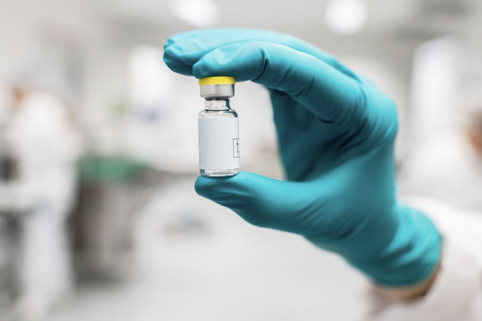Johnson & Johnson’s Covid-19 Vaccine Could Alter the Course of the Pandemic. Investors Will Soon Know if It Works.
Johnson & Johnson’s Covid-19 Vaccine Could Alter the Course of the Pandemic. Investors Will Soon Know if It Works.
Jan. 12, 2021 8:49 am ET

Johnson & Johnson has a goal of manufacturing a billion vaccine doses this year.
Courtesy Johnson & Johnson
Johnson & Johnson says it can make enough doses of its Covid-19 vaccine this year to inoculate almost a billion people against the virus.
That would be a massive shot in the arm to the effort to end the pandemic—as long as the vaccine works. Its efficacy should become clear in just a few days.
Speaking at an industry conference on Monday, Johnson & Johnson (ticker: JNJ) CEO Alex Gorsky said that the company is in the “final stages” of analyzing the data from its 45,000-patient Phase 3 trial of the single-dose version of its vaccine. Bloomberg also reported on Monday that the study would be ready to submit to the U.S. Food and Drug Administration for emergency authorization on Jan. 21, citing a report in a South African newspaper.
- Moderna Says Vaccine Should Offer a Year of Protection
- Pfizer Says It Can Quickly Develop Vaccines for Future Variants
“We hope to have that information very soon,” Gorsky said, in reference to the study results, at a panel at J.P. Morgan’s annual health care conference.
The data from that Phase 3 trial, called Ensemble, is perhaps the most-anticipated pharmaceutical study data of the early part of this year. If positive, the results could accelerate the global Covid-19 vaccination effort, boosting the number of available doses and introducing a vaccine option that will be much easier for public health officials to handle.
In other words, it could alter the course of the pandemic.
Unlike the vaccines from Pfizer (PFE) and Moderna (MRNA), which require a two-dose regimen, the Johnson & Johnson vaccine is being tested in a single-dose formulation. The vaccine also is not subject to the same cumbersome storage requirements as the two authorized vaccines.
“The JNJ data could be the most influential event of the month given its potential impact on the market and on [Moderna] and [Pfizer] as first-to-market players,” wrote Jefferies health-care trading-desk analyst Jared Holz in an email to investors on Monday. “JNJ, as a single injection that has a less cumbersome supply chain around it, could be very important.”
The Moderna and Pfizer vaccines, however, set a high bar in their Phase 3 trials, with each reporting efficacy rates above 90%. While results are difficult to compare between trials, a significantly weaker showing by the Johnson & Johnson vaccine could complicate its rollout.
“Buyside consensus is ~85%+ efficacy” for the Johnson & Johnson vaccine, Jefferies analyst Michael Yee wrote in a Jan. 8 note. Less than “85% would be materially weaker,” he said.
If the vaccine performs well enough to receive FDA authorization, but measurably worse than the previously-authorized Moderna and Pfizer vaccines, it could set up dilemmas for health officials and providers. While the Johnson & Johnson vaccine would be easier and cheaper to distribute, patients might balk at getting a vaccine perceived to be less-protective.
In addition to the Ensemble trial, Johnson & Johnson is running another Phase 3 trial of the vaccine, called Ensemble 2, which is testing a two-dose regimen of the vaccine.
Gorsky said in his Monday presentation that the company has a goal of manufacturing “close to 1 billion” doses by the end of this year. If the Ensemble trial data is positive, that would be enough to inoculate close to a billion people. Speaking at a separate presentation on Monday, the CEO of BioNTech (BNTX), which worked with Pfizer on their Covid-19 vaccine, said that the companies hope to manufacture 2 billion doses of their vaccine this year, enough to inoculate 1 billion people.
While it’s not a major manufacturer of vaccines, Johnson & Johnson was the first Big Pharma company to announce a Covid-19 vaccine program back in January of 2020. Its vaccine, which uses an altered version of a cold virus called Ad26 to carry DNA for a piece of the SARS-CoV-2 virus into the patient’s cells, uses a platform that the company had previously used to make an Ebola vaccine.
Shares of Johnson & Johnson fell 0.4% on Monday, and were up nearly 0.3% in premarket trading on Tuesday, compared with S&P 500 futures’ gain of 0.2%. The stock is up 8.8% over the past 12 months and trades at 17.8 times earnings expected over the next 12 months, above its 5-year average of 16.4 times earnings. Of the 18 analysts tracked by FactSet who cover the stock, 12 rate it Overweight or a Buy, five rate it a Hold, and one rates it a Sell.
- Last:Delta Kicks Off Earnings Season for Airlines on Thursday. It 2021/1/14
- Next:There Is an Auto Chip Shortage. That Will Slow Down Car Make 2021/1/13
